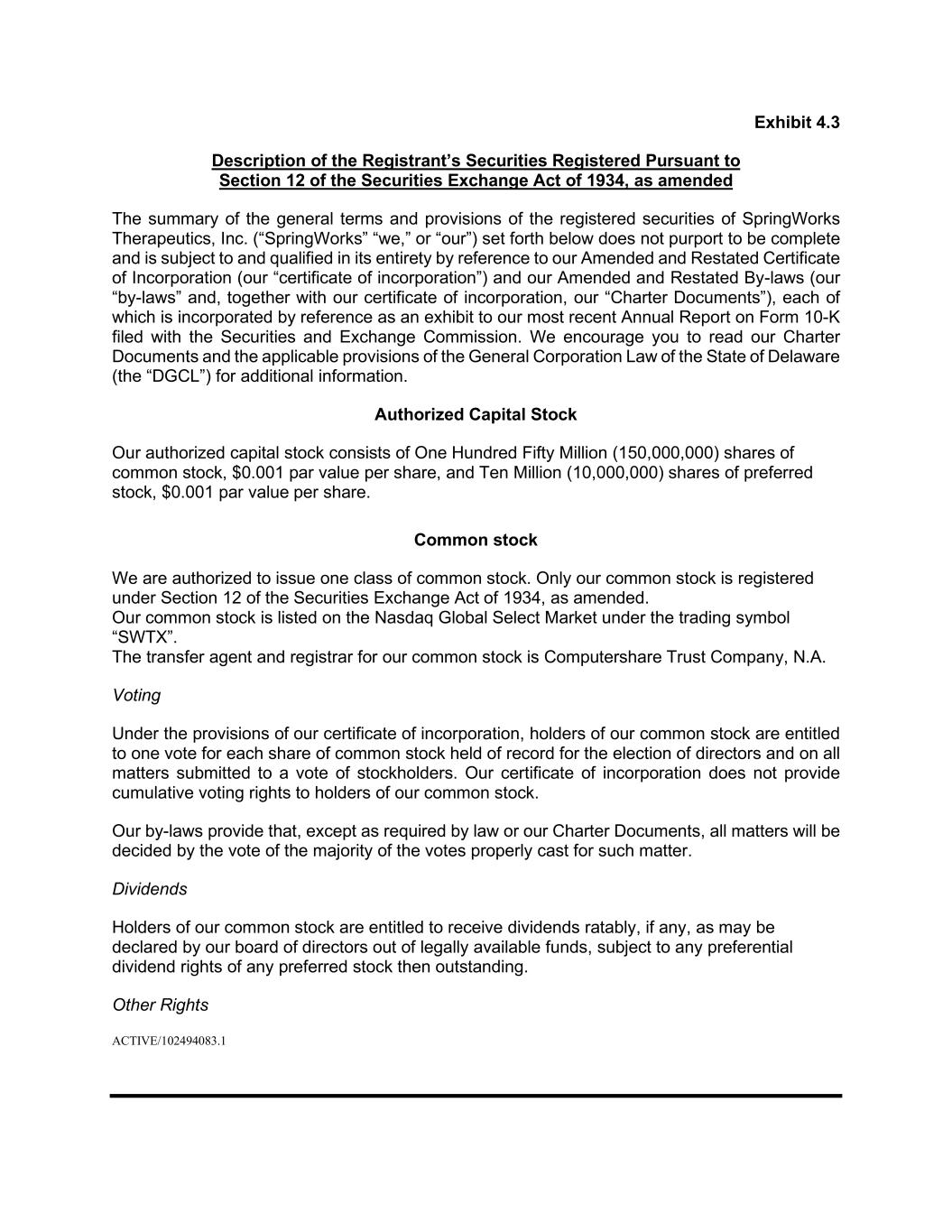
Exhibit 4.3 Description of the Registrant’s Securities Registered Pursuant to Section 12 of the Securities Exchange Act of 1934, as amended The summary of the general terms and provisions of the registered securities of SpringWorks Therapeutics, Inc. (“SpringWorks” “we,” or “our”) set forth below does not purport to be complete and is subject to and qualified in its entirety by reference to our Amended and Restated Certificate of Incorporation (our “certificate of incorporation”) and our Amended and Restated By-laws (our “by-laws” and, together with our certificate of incorporation, our “Charter Documents”), each of which is incorporated by reference as an exhibit to our most recent Annual Report on Form 10-K filed with the Securities and Exchange Commission. We encourage you to read our Charter Documents and the applicable provisions of the General Corporation Law of the State of Delaware (the “DGCL”) for additional information. Authorized Capital Stock Our authorized capital stock consists of One Hundred Fifty Million (150,000,000) shares of common stock, $0.001 par value per share, and Ten Million (10,000,000) shares of preferred stock, $0.001 par value per share. Common stock We are authorized to issue one class of common stock. Only our common stock is registered under Section 12 of the Securities Exchange Act of 1934, as amended. Our common stock is listed on the Nasdaq Global Select Market under the trading symbol “SWTX”. The transfer agent and registrar for our common stock is Computershare Trust Company, N.A. Voting Under the provisions of our certificate of incorporation, holders of our common stock are entitled to one vote for each share of common stock held of record for the election of directors and on all matters submitted to a vote of stockholders. Our certificate of incorporation does not provide cumulative voting rights to holders of our common stock. Our by-laws provide that, except as required by law or our Charter Documents, all matters will be decided by the vote of the majority of the votes properly cast for such matter. Dividends Holders of our common stock are entitled to receive dividends ratably, if any, as may be declared by our board of directors out of legally available funds, subject to any preferential dividend rights of any preferred stock then outstanding. Other Rights ACTIVE/102494083.1
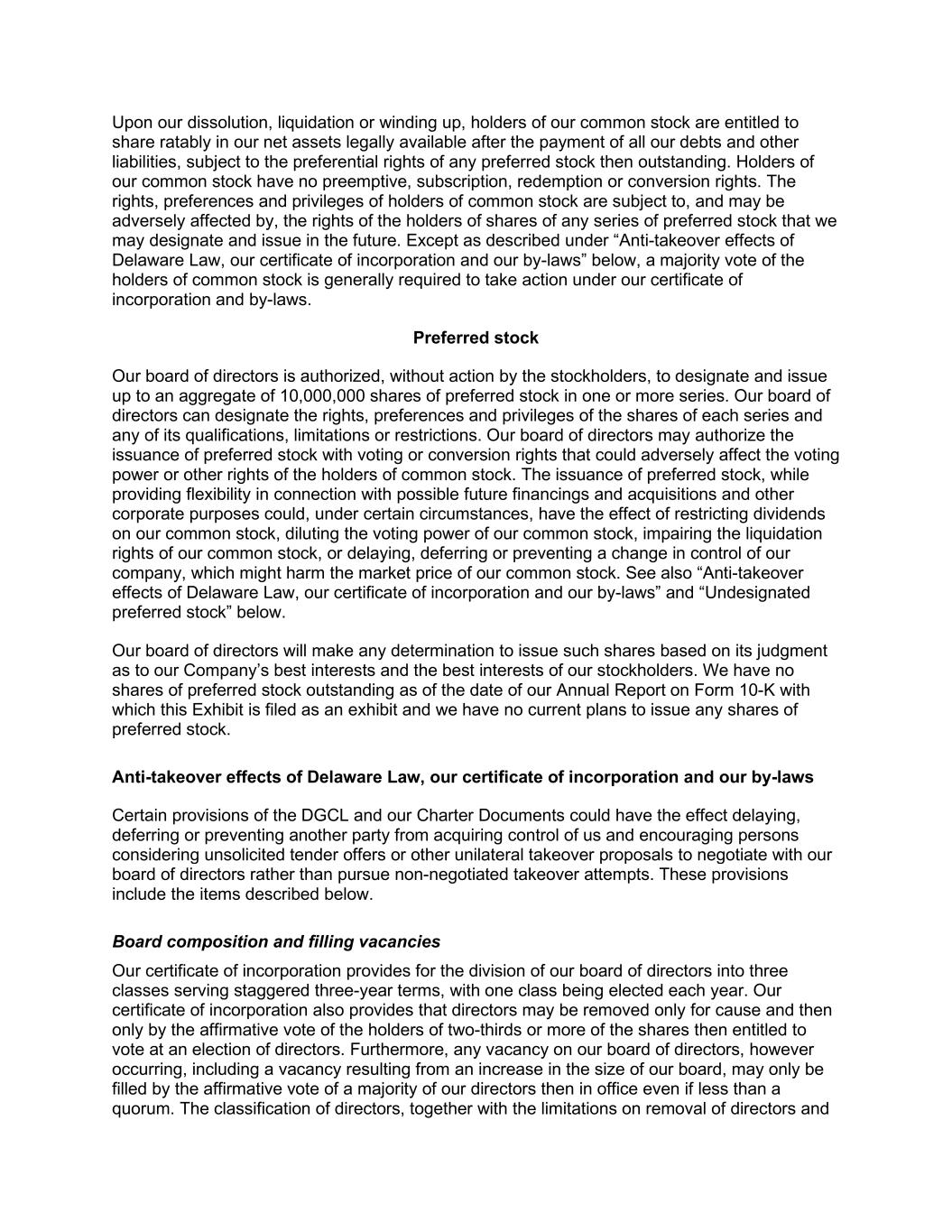
Upon our dissolution, liquidation or winding up, holders of our common stock are entitled to share ratably in our net assets legally available after the payment of all our debts and other liabilities, subject to the preferential rights of any preferred stock then outstanding. Holders of our common stock have no preemptive, subscription, redemption or conversion rights. The rights, preferences and privileges of holders of common stock are subject to, and may be adversely affected by, the rights of the holders of shares of any series of preferred stock that we may designate and issue in the future. Except as described under “Anti-takeover effects of Delaware Law, our certificate of incorporation and our by-laws” below, a majority vote of the holders of common stock is generally required to take action under our certificate of incorporation and by-laws. Preferred stock Our board of directors is authorized, without action by the stockholders, to designate and issue up to an aggregate of 10,000,000 shares of preferred stock in one or more series. Our board of directors can designate the rights, preferences and privileges of the shares of each series and any of its qualifications, limitations or restrictions. Our board of directors may authorize the issuance of preferred stock with voting or conversion rights that could adversely affect the voting power or other rights of the holders of common stock. The issuance of preferred stock, while providing flexibility in connection with possible future financings and acquisitions and other corporate purposes could, under certain circumstances, have the effect of restricting dividends on our common stock, diluting the voting power of our common stock, impairing the liquidation rights of our common stock, or delaying, deferring or preventing a change in control of our company, which might harm the market price of our common stock. See also “Anti-takeover effects of Delaware Law, our certificate of incorporation and our by-laws” and “Undesignated preferred stock” below. Our board of directors will make any determination to issue such shares based on its judgment as to our Company’s best interests and the best interests of our stockholders. We have no shares of preferred stock outstanding as of the date of our Annual Report on Form 10-K with which this Exhibit is filed as an exhibit and we have no current plans to issue any shares of preferred stock. Anti-takeover effects of Delaware Law, our certificate of incorporation and our by-laws Certain provisions of the DGCL and our Charter Documents could have the effect delaying, deferring or preventing another party from acquiring control of us and encouraging persons considering unsolicited tender offers or other unilateral takeover proposals to negotiate with our board of directors rather than pursue non-negotiated takeover attempts. These provisions include the items described below. Board composition and filling vacancies Our certificate of incorporation provides for the division of our board of directors into three classes serving staggered three-year terms, with one class being elected each year. Our certificate of incorporation also provides that directors may be removed only for cause and then only by the affirmative vote of the holders of two-thirds or more of the shares then entitled to vote at an election of directors. Furthermore, any vacancy on our board of directors, however occurring, including a vacancy resulting from an increase in the size of our board, may only be filled by the affirmative vote of a majority of our directors then in office even if less than a quorum. The classification of directors, together with the limitations on removal of directors and

ACTIVE/102494083.1
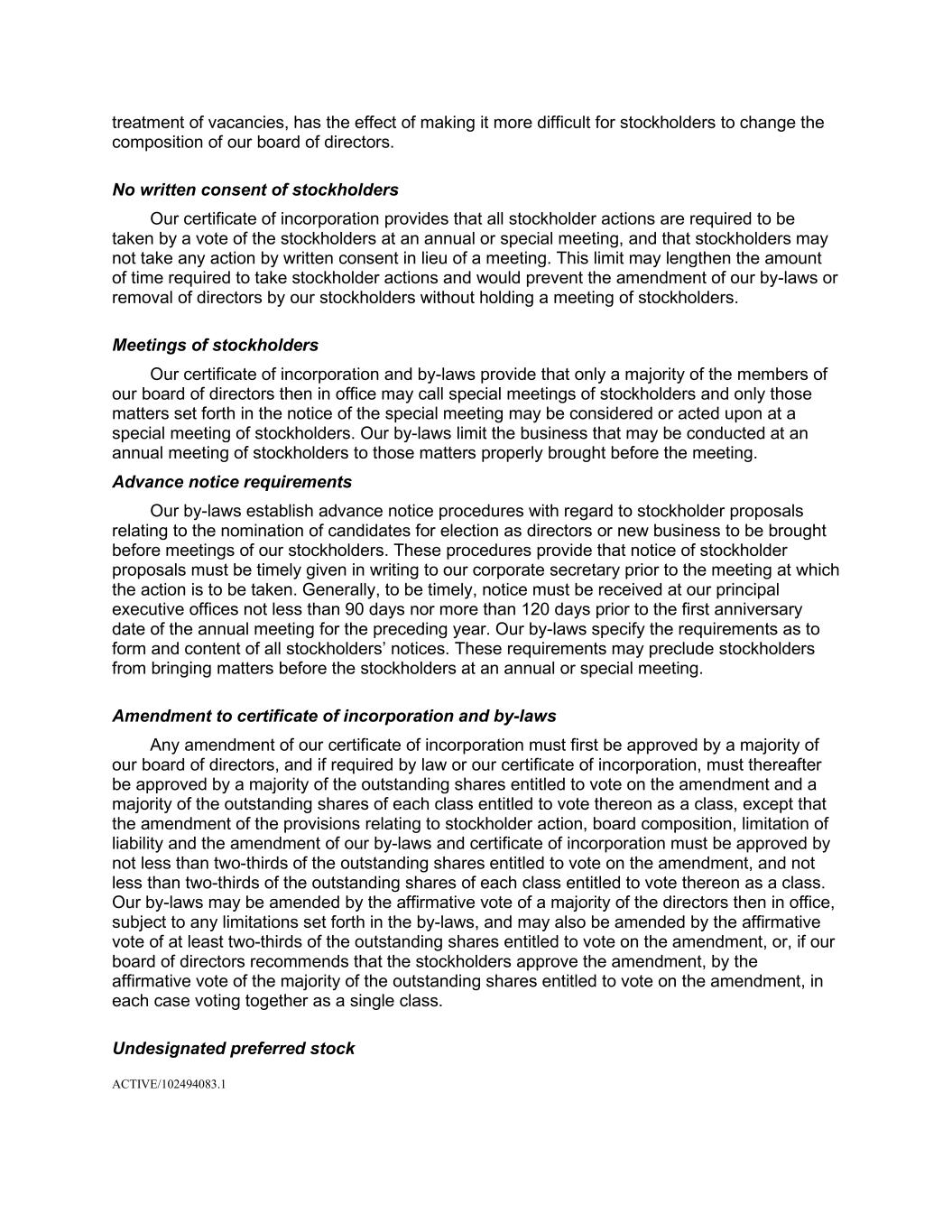
treatment of vacancies, has the effect of making it more difficult for stockholders to change the composition of our board of directors. No written consent of stockholders Our certificate of incorporation provides that all stockholder actions are required to be taken by a vote of the stockholders at an annual or special meeting, and that stockholders may not take any action by written consent in lieu of a meeting. This limit may lengthen the amount of time required to take stockholder actions and would prevent the amendment of our by-laws or removal of directors by our stockholders without holding a meeting of stockholders. Meetings of stockholders Our certificate of incorporation and by-laws provide that only a majority of the members of our board of directors then in office may call special meetings of stockholders and only those matters set forth in the notice of the special meeting may be considered or acted upon at a special meeting of stockholders. Our by-laws limit the business that may be conducted at an annual meeting of stockholders to those matters properly brought before the meeting. Advance notice requirements Our by-laws establish advance notice procedures with regard to stockholder proposals relating to the nomination of candidates for election as directors or new business to be brought before meetings of our stockholders. These procedures provide that notice of stockholder proposals must be timely given in writing to our corporate secretary prior to the meeting at which the action is to be taken. Generally, to be timely, notice must be received at our principal executive offices not less than 90 days nor more than 120 days prior to the first anniversary date of the annual meeting for the preceding year. Our by-laws specify the requirements as to form and content of all stockholders’ notices. These requirements may preclude stockholders from bringing matters before the stockholders at an annual or special meeting. Amendment to certificate of incorporation and by-laws Any amendment of our certificate of incorporation must first be approved by a majority of our board of directors, and if required by law or our certificate of incorporation, must thereafter be approved by a majority of the outstanding shares entitled to vote on the amendment and a majority of the outstanding shares of each class entitled to vote thereon as a class, except that the amendment of the provisions relating to stockholder action, board composition, limitation of liability and the amendment of our by-laws and certificate of incorporation must be approved by not less than two-thirds of the outstanding shares entitled to vote on the amendment, and not less than two-thirds of the outstanding shares of each class entitled to vote thereon as a class. Our by-laws may be amended by the affirmative vote of a majority of the directors then in office, subject to any limitations set forth in the by-laws, and may also be amended by the affirmative vote of at least two-thirds of the outstanding shares entitled to vote on the amendment, or, if our board of directors recommends that the stockholders approve the amendment, by the affirmative vote of the majority of the outstanding shares entitled to vote on the amendment, in each case voting together as a single class. Undesignated preferred stock ACTIVE/102494083.1

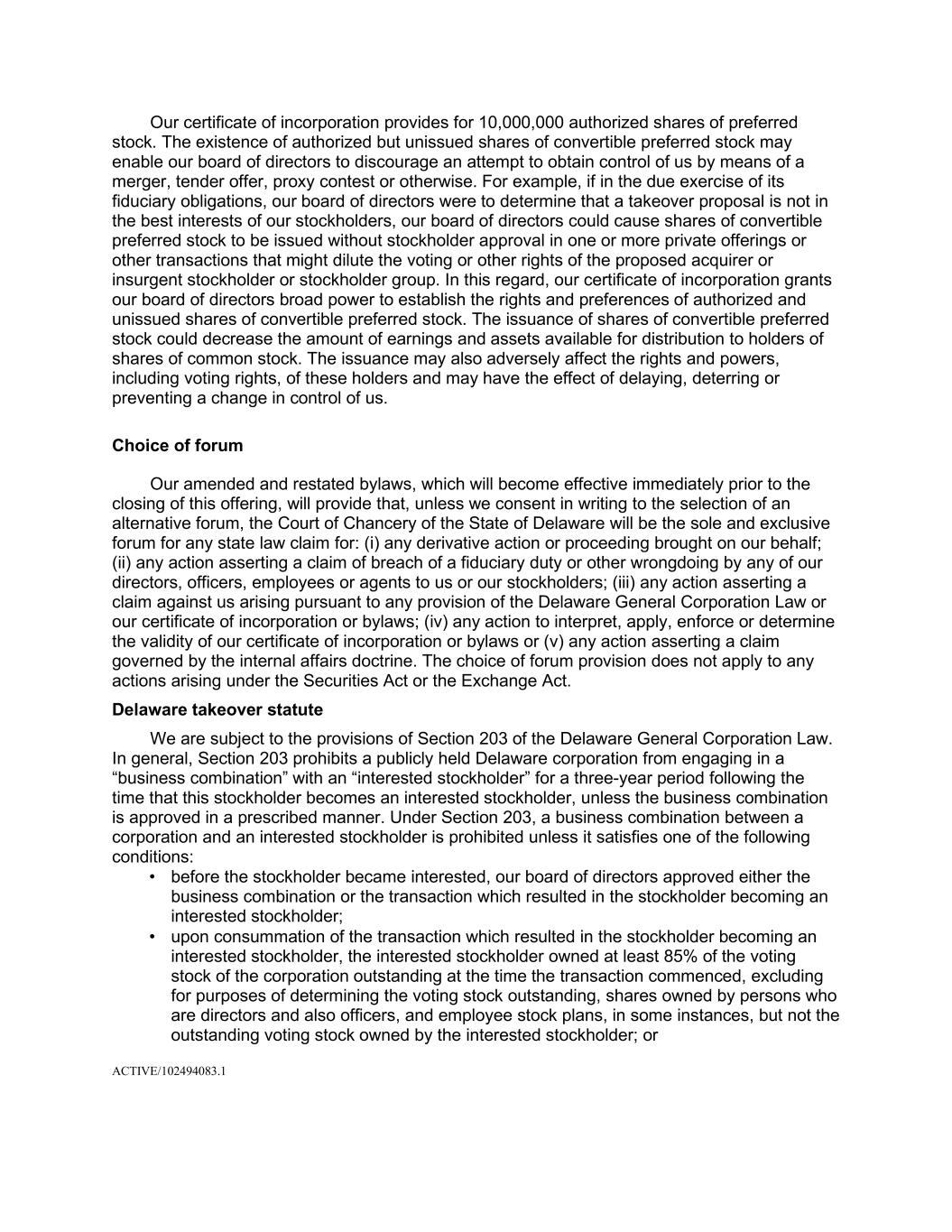
Our certificate of incorporation provides for 10,000,000 authorized shares of preferred stock. The existence of authorized but unissued shares of convertible preferred stock may enable our board of directors to discourage an attempt to obtain control of us by means of a merger, tender offer, proxy contest or otherwise. For example, if in the due exercise of its fiduciary obligations, our board of directors were to determine that a takeover proposal is not in the best interests of our stockholders, our board of directors could cause shares of convertible preferred stock to be issued without stockholder approval in one or more private offerings or other transactions that might dilute the voting or other rights of the proposed acquirer or insurgent stockholder or stockholder group. In this regard, our certificate of incorporation grants our board of directors broad power to establish the rights and preferences of authorized and unissued shares of convertible preferred stock. The issuance of shares of convertible preferred stock could decrease the amount of earnings and assets available for distribution to holders of shares of common stock. The issuance may also adversely affect the rights and powers, including voting rights, of these holders and may have the effect of delaying, deterring or preventing a change in control of us. Choice of forum Our amended and restated bylaws, which will become effective immediately prior to the closing of this offering, will provide that, unless we consent in writing to the selection of an alternative forum, the Court of Chancery of the State of Delaware will be the sole and exclusive forum for any state law claim for: (i) any derivative action or proceeding brought on our behalf; (ii) any action asserting a claim of breach of a fiduciary duty or other wrongdoing by any of our directors, officers, employees or agents to us or our stockholders; (iii) any action asserting a claim against us arising pursuant to any provision of the Delaware General Corporation Law or our certificate of incorporation or bylaws; (iv) any action to interpret, apply, enforce or determine the validity of our certificate of incorporation or bylaws or (v) any action asserting a claim governed by the internal affairs doctrine. The choice of forum provision does not apply to any actions arising under the Securities Act or the Exchange Act. Delaware takeover statute We are subject to the provisions of Section 203 of the Delaware General Corporation Law. In general, Section 203 prohibits a publicly held Delaware corporation from engaging in a “business combination” with an “interested stockholder” for a three-year period following the time that this stockholder becomes an interested stockholder, unless the business combination is approved in a prescribed manner. Under Section 203, a business combination between a corporation and an interested stockholder is prohibited unless it satisfies one of the following conditions: • before the stockholder became interested, our board of directors approved either the business combination or the transaction which resulted in the stockholder becoming an interested stockholder; • upon consummation of the transaction which resulted in the stockholder becoming an interested stockholder, the interested stockholder owned at least 85% of the voting stock of the corporation outstanding at the time the transaction commenced, excluding for purposes of determining the voting stock outstanding, shares owned by persons who are directors and also officers, and employee stock plans, in some instances, but not the outstanding voting stock owned by the interested stockholder; or ACTIVE/102494083.1

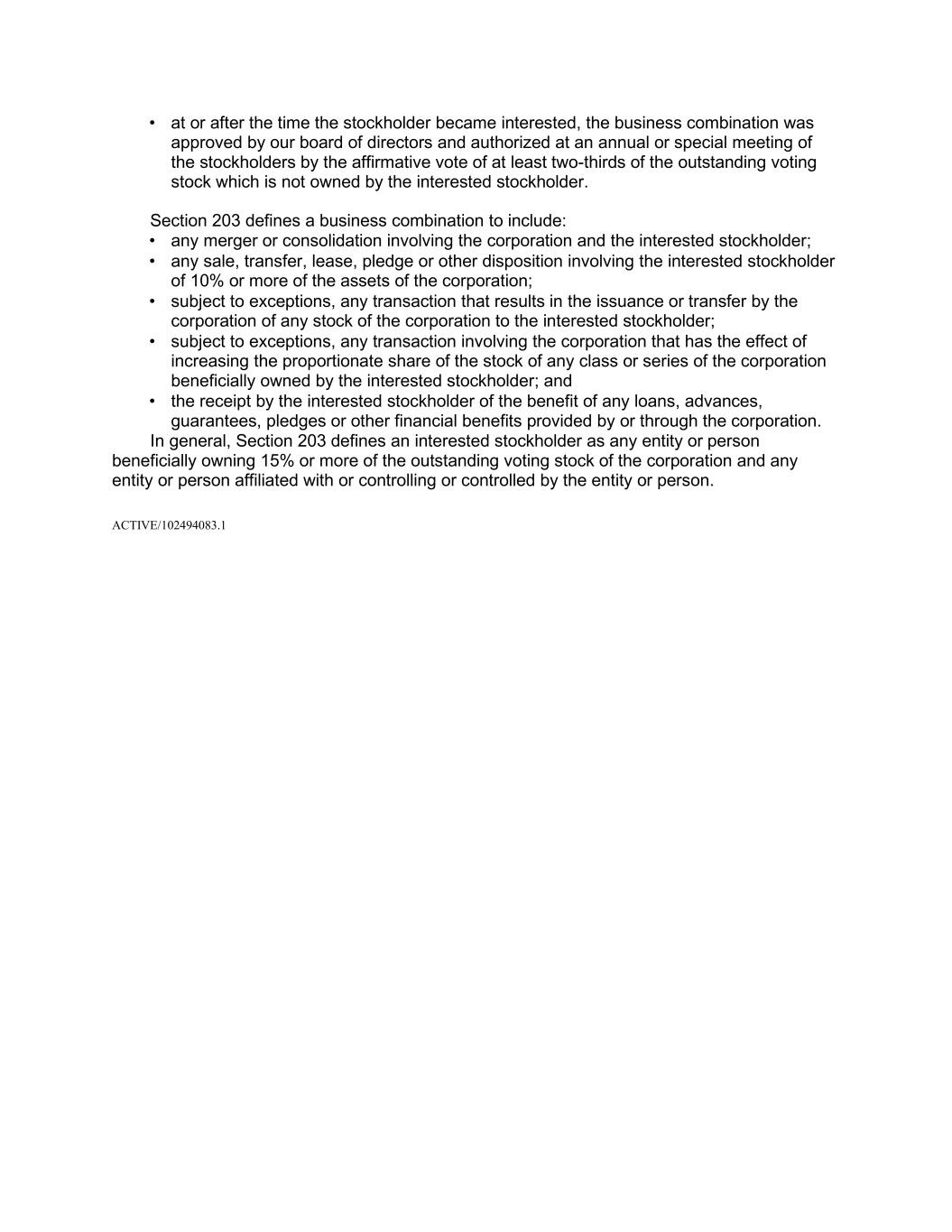
• at or after the time the stockholder became interested, the business combination was approved by our board of directors and authorized at an annual or special meeting of the stockholders by the affirmative vote of at least two-thirds of the outstanding voting stock which is not owned by the interested stockholder. Section 203 defines a business combination to include: • any merger or consolidation involving the corporation and the interested stockholder; • any sale, transfer, lease, pledge or other disposition involving the interested stockholder of 10% or more of the assets of the corporation; • subject to exceptions, any transaction that results in the issuance or transfer by the corporation of any stock of the corporation to the interested stockholder; • subject to exceptions, any transaction involving the corporation that has the effect of increasing the proportionate share of the stock of any class or series of the corporation beneficially owned by the interested stockholder; and • the receipt by the interested stockholder of the benefit of any loans, advances, guarantees, pledges or other financial benefits provided by or through the corporation. In general, Section 203 defines an interested stockholder as any entity or person beneficially owning 15% or more of the outstanding voting stock of the corporation and any entity or person affiliated with or controlling or controlled by the entity or person. ACTIVE/102494083.1